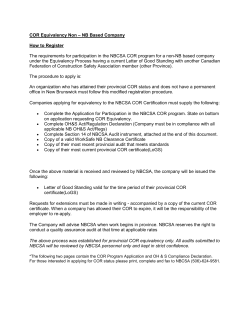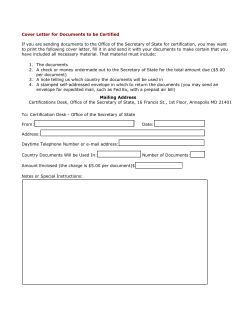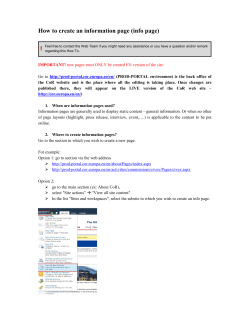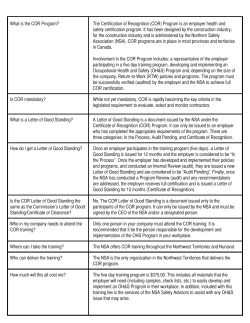
For the Certification of Operations Located in Canada to the
For the Certification of Operations Located in Canada to the Canadian Organic Regime (COR) CCOF CERTIFICATION SERVICES, LLC 2155 Delaware Ave, Suite 150 Santa Cruz, CA 95060 (831) 423-2263 ccof@ccof.org www.ccof.org July 2014 TABLE OF CONTENTS TABLE OF CONTENTS ....................................................................................................................................................... 2 ACRONYMS USED ........................................................................................................................................................... 3 INTRODUCTION .............................................................................................................................................................. 3 SECTION ONE: FREQUENTLY ASKED QUESTIONS .............................................................................................................. 3 Q1: DO I NEED TO BE CERTIFIED TO THE CCOF COR COMPLIANCE PROGRAM? ........................................................................................ 3 Q2: HOW MUCH DOES CCOF COR COMPLIANCE CERTIFICATION COST? ................................................................................................. 3 Q3: HOW DO I OBTAIN COR COMPLIANCE CERTIFICATION FROM CCOF? ............................................................................................... 3 Q4: WHAT/ WHO IS THE CANADIAN ORGANIC REGIME (COR)? ............................................................................................................ 3 Q5: WHAT IS THE DIFFERENCE BETWEEN CERTIFICATION TO THE CANADIAN ORGANIC REGIME (COR) AND CANADIAN ORGANIC EQUIVALENCY? 4 SECTION TWO: CERTIFICATION PROCESS ......................................................................................................................... 4 2.1 COMPLAINT LOG ...................................................................................................................................................................... 4 2.2 APPLICATION ........................................................................................................................................................................... 4 2.3 ON-SITE INSPECTION ................................................................................................................................................................ 4 2.4 ADDITIONAL ON-SITE PROVISIONS .............................................................................................................................................. 4 2.5 ADDITIONAL (ANNOUNCED & UNANNOUNCED) ON-SITE INSPECTIONS ............................................................................................. 5 2.6 MODIFICATION OF CERTIFICATION............................................................................................................................................... 5 2.7 SUSPENSION AND CANCELLATION OF CERTIFICATION ...................................................................................................................... 5 2.8 APPEALS ................................................................................................................................................................................. 5 2.9 COMPLAINTS OR DISPUTES ...................................................................................................................................................... 6 SECTION THREE: COR STANDARDS ................................................................................................................................... 6 CCOF COR Compliance Program Manual July 2014 Page 2 of 6 ACRONYMS USED CFIA: Canadian Food Inspection Agency COR: Canadian Organic Regime NOP: National Organic Program OSP: Organic System Plan USDA: United States Dept. of Agriculture INTRODUCTION CCOF’s Canadian Organic Regime (COR) Compliance certification program is for operations located within Canada. These regulations differ from the United States Department of Agriculture National Organic Program (NOP) standards and are required for any operations or facilities in Canada as of June 30, 2009. SECTION ONE: FREQUENTLY ASKED QUESTIONS Q1: DO I NEED TO BE CERTIFIED TO THE CCOF COR COMPLIANCE PROGRAM? A1: If any part of your organic operation is handling or processing organic products within Canada, you must be certified to the COR Compliance program. Operations that produce or handle non-food items such as personal care products, textiles, pet food and retail establishments, are outside the scope of CFIA’s COR authority and do not require COR certification. CCOF will offer NOP certification to operators in Canada when they are producing these products that are outside of the scope of COR authority. Q2: HOW MUCH DOES CCOF COR COMPLIANCE CERTIFICATION COST? A2: For certification of operations located in Canada, CCOF will charge $1,500 minimum annual certification fee, plus all other applicable fees (such as inspection fees, late fees, etc) as described in the CCOF Certification Program Manual. Where Organic Production Value (OPV) is greater than $600,000, the annual certification fee described in the CCOF Certification Services Program Manual Fee Schedule will apply. CCOF COR Compliance Program Manual July 2014 Q3: HOW DO I OBTAIN COR COMPLIANCE CERTIFICATION FROM CCOF? A3: There are three simple steps for attaining COR certification. Step 1: Complete the COR Application & Organic System Plan (OSP), and submit it directly to CCOF. Operations with production in both the United States and Canada must maintain a separate COR certification for Canada and NOP certification for the US. Step 2: Pay the required fees. CCOF will invoice you when we receive your COR Compliance Application and again each year at the Continuation of Certification due January 1. Step 3: Complete an inspection. After the inspection, CCOF will review the inspection and determine compliance. Q4: WHAT/ WHO IS THE CANADIAN ORGANIC REGIME (COR)? A4: COR is overseen by the Canadian Food Inspection Agency (CFIA) and is composed of several constituent parts. Each part plays a role in defining how operators demonstrate compliance and the roles of certifiers, standards setting bodies, and enforcement arms. Regulation establishing the Organic Products Regulation (COR), released in its final version June 24, 2009. Organic Production Systems General Principles and Management Standards (CAN/CBSB-32.3102006). These are the National Standards of Canada which establish the production practices that must be followed by operators. Organic Production Systems Permitted Substances Lists (CAN/CGSB 32.311). This list identifies materials that may be used in the production of organic products under COR. Canada Organic Office Operating Manual Published by the CFIA, this manual identifies the manual for entities involved in administrating the COR. These include requirements and procedures for certifiers, accreditors, and the CFIA itself. The Operating Manual includes numerous requirements that affect certifiers’ accreditation and will result in certification processes or requirements that affect operations seeking certification under COR. Page 3 of 6 Q5: WHAT IS THE DIFFERENCE BETWEEN CERTIFICATION TO THE CANADIAN ORGANIC REGIME (COR) AND CANADIAN ORGANIC EQUIVALENCY? A5: Only operations inside of Canada can be certified to the COR standards directly. Under the terms of the USCanada equivalency arrangement signed on July 1, 2008 products certified to the NOP standards are considered equivalent to COR certified product may be shipped to Canada and use the “Canada Organic” seal so long as the products meet three critical variances. Operations in Canada may not be certified to NOP standards unless they are outside the scope of COR, such as personal care products or pet food. 2.2 APPLICATION10 To request certification to COR Compliance, an operation must complete the CCOF Application and COR Organic System Plan. The process for application is described per the CCOF Certification Services Program Manual and the forms can be downloaded at www.ccof.org. All applicants with dual or multiple certifications with the same certification scope must provide written consent for CCOF to receive from the certifier or certifiers the following upon application: SECTION TWO: CERTIFICATION PROCESS Current certification decisions, Any major non-compliances, Evidence of corrective actions(s), Copies of transactions certificates or information regarding sales, and/or Any denials or suspension/revocations. 2.3 ON-SITE INSPECTION11 The process and requirements for certification to the CCOF COR Compliance program are described in the CCOF Certification Services Program Manual. The CCOF Certification Services Program Manual describes all aspects of the certification process, including Application, Application Review1, Granting of Certification2, On-Site Inspection3, Additional (Announced & Unannounced) Onsite Inspections, Noncompliance Procedure, Certification Sanctions4, Denial of Certification (Applicants)5, Suspension and Cancellation of Certification6, Appeals7 and Complaints8. Areas where the CCOF COR Compliance certification program process differs from that described in the CCOF Certification Services Program Manual, including additions, deletions or modifications, are listed below. 2.1 COMPLAINT LOG9 All COR Compliance program clients must keep a record of all complaints received that relate to a product’s compliance with CCOF COR Compliance program standards. A record of all complaints must be made available to CCOF when requested. The record must show that appropriate action is taken with respect to each received complaint. 1 ISO/IEC 17065 7.1-7.3.5 ISO/IEC 17065 7.6 ISO/ICE 17065 7.4 4 ISO/IEC 17065 7.11 & 7.13 5 ISO/IEC 17065 4.4.3 6 ISO/IEC 17065 7.11-7.11.6 7 ISO/IEC 17065 7.13, 8 ISO/IEC 17065 7.13 9 ISO/IEC 17065 4.1.2.2.c.2 & 4.1.2.2.j 2 3 CCOF COR Compliance Program Manual July 2014 The CCOF CS inspector will start the inspection by conducting an introductory meeting with the representatives of the operation. CCOF reserves the right to make all inspection assignments. CCOF clients may not influence the choice of inspector or contact inspectors directly to solicit inspection assignments. Operators have the right to be informed about the identity of the inspector before the inspection visit, and may raise objections based on conflicts of interest or other reasons. The certification body shall rule whether the grounds on which the inspector was refused is accepted. CCOF may provide foreign accreditation agencies and/or import authorities with copies of inspection reports when required exclusively for the purpose of gaining import licenses for CCOF clients or their customers. When inspection reports etc. are provided CCOF will notify the client of this occurrence. 2.4 ADDITIONAL ON-SITE PROVISIONS In addition to other on-site provisions, inspections for COR Compliance certification program clients will take into account the intensity of the production system, production types, company size, previous inspection/review results, complaints, and parallel production. CCOF will also include identification and investigation of areas of risk, review of records and accounts, 10 11 ISO/IEC 17065 7.1 -7.3.5 ISO/IEC 17065 7.4 & COO Operating Manual C2.3 Page 4 of 6 productions/sales reconciliation on farms, the performance of input/output reconciliation and trace back audits in processing and handling, and verification that changes have taken place per any changes in COR standards.12 The inspections for all clients seeking COR compliance certification may include the observation of the entire agricultural production system being managed by the operation, even if only part of the operation is enrolled in the organic certification program. Inspections may include observation of non-organic production and processing operations, including packaging and labeling of nonorganic products. This requirement applies where there are organic and non-organic sites managed by the same clients in the same location. 13 Clients must be able to demonstrate during onsite inspections functioning audit trail/record keeping systems that include traceability. 2.5 ADDITIONAL (ANNOUNCED & UNANNOUNCED) ON-SITE INSPECTIONS14 CCOF reserves the right to conduct additional on-site inspections of both applicants for certification and certified operations to determine compliance with the applicable international organic production and handling regulations. The performance of unannounced inspections will be decided by CCOF based on risk analysis, taking into account factors such as the type of production, the operator’s record of compliance and complexity of production, or ensure corrective actions addressed and resolved nonconformities. The CAEQ may require that additional inspections be performed by CCOF for the purpose of determining compliance or equivalence with applicable international organic production and handling regulations. Additional inspections may be announced or unannounced at the discretion of the CCOF or as required by CAEQ. In addition to the regular inspections, CCOF will conduct unannounced inspections of at least 3% of COR primary producers, and 5% of other COR clientele. CCOF may use any of the following criteria when deciding to assign an unannounced inspection to an operation: Possible non-compliant activity Potential for drift Observation of specific crops or production activities 2.6 MODIFICATION OF CERTIFICATION15 CCOF will inform clients, in writing, when they are affected by a change, modification (such as reduction, expansion, or extension), or cancellation or suspension of certification in whole or in part. 2.7 SUSPENSION16 AND CANCELLATION OF CERTIFICATION17 Under COR, certification continues until cancelled or suspended. If an operation voluntarily withdraws from the CCOF COR Compliance Program, CCOF will issue a Notice of Cancellation of Certification. In the case of cancellation of certification, the operation has the right to be heard, either orally or in writing. Clients must also cease all claims of the CCOF logo and name, destroy or return all certificates, labeling and marketing materials containing reference to CCOF, and are liable for the costs of services provided up to the point of withdrawal. CCOF shall reinstate suspended certification only after the CFIA has been notified and the date of the certification reinstatement is posted on the CFIA published list of suspended and cancelled organic certifications. CCOF will report to CFIA all suspensions and cancellations of certification within 30 days via CCOF’s Certification Verification Body (CAEQ). CCOF will not grant certification to an operator who has previously cancelled or whose name appears on the CFIA published list of suspended and cancelled organic certifications unless the operator has undergone application and CCOF has received conformation from the CFIA that the date of the certification reinstatement is posted on the CFIA list. CCOF will send the request within 5 working days from the certification decision. 2.8 APPEALS18 An applicant for certification may appeal a CCOF CS notice of denial of certification, and a certified operation may appeal a CCOF CS notification of cancelled certification, proposed suspension, other adverse action or decision. CCOF CS will carry out the appeal pursuant to the following: 15 ISO/IEC 17065 ISO/IEC 17065 ISO/IEC 17065 2.10.4 18 ISO/IEC 17065 16 12 13 14 COO Operating Manual 2.3.12 & 2.3.13 COO Operating Manual C2.3.1 & C 2.3.4 COO Operating Manual 2.9.1, 2.9.2 & 2.6.1 CCOF COR Compliance Program Manual July 2014 Result of a complaint or investigation Any logical reason Random selection 17 7.10 7.11 7.11-7.11.6 & COO Operating Manual 2.7.4, 2.10.2, 2.10.3 & 7.13 & COO Operating Manual C4.2.1 Page 5 of 6 All written communications between parties involved in appeal proceedings must be sent to the recipient's place of business by a delivery service, which provides dated return receipts. An appeal must be filed as required in the notification or within 30 days from receipt of the notification, whichever occurs later. All appeals must include a copy of the adverse decision and a statement of the appellant’s reasons for believing that the decision was not proper or made in accordance with COR regulations. The appeal will be considered “filed” on the date received by CCOF CS. All appeals shall be reviewed in a timely manner, heard and decided by persons not involved with the decision being appealed. The CCOF CS Ad Hoc Appeals Committee shall render a final and nonappealable decision to sustain, deny, suspend or revoke certification. Alternatively, they may sustain or deny an appeal regarding an adverse action. 2.9 COMPLAINTS OR DISPUTES19 CCOF reserves the right to investigate complaints or disputes of noncompliance applicable to the COR Compliance program organic production and handling regulations, and/or complaints against the performance of CCOF as a certification body from operators or outside persons or organizations. CCOF is committed to investigating complaints or disputes that are submitted in writing and that provide evidence that supports the allegation(s). CCOF conducts investigations in a timely manner, confidentially and based only on documented evidence. If a certified party or applicant refuses to cooperate in an investigation, CCOF may deem this sufficient cause for denial or suspension and/or cancellation of certification. A certified party must also maintain records of such complaints per Section 2.1 Complaint Log as described above. Manual). The full text of the Canadian National Organic Standards may be accessed at any time via www.ccof.org/canada or by contacting the CCOF office to request a paper copy. Operations seeking certification as COR compliant are responsible for reviewing the full text of the Canadian National Organic Standards. The scopes of certification offered by CCOF’s COR Compliance program includes crop production, wild crops, livestock production and the preparation and handling of organic products. CCOF CS will notify producers of changes to the CCOF COR Compliance program and will provide clients with six months notice prior to enforcement of any standard change when possible. Operations in CCOF ’s COR Compliance program will be given two months from publication of any notice of amendments to the regulations and will be given 12 months from the implementation date to demonstrate full compliance with new standards and/or requirements established through amendments to CAN/CGSB 32.310 and/or 32.311. If at any point during certification activities, interpretation of an applicable regulation is required, it can be sought from the Standards Interpretation Committee, as described in the Canada Organic Office Operating Manual. 3.1 ORGANIC PRODUCT LABELING REQUIREMENTS CCOF clients must disclose all labels and brands manufactured under CCOF certification(s), including private labels or other brands not owned by the client. All labels used on packaging must be included in the Organic System Plan and approved by CCOF CS prior to printing. Labels must meet the Canadian organic label requirements, described in the CCOF Canada labeling guide at www.ccof.org/canada . SECTION THREE: COR STANDARDS20 CCOF’s COR Compliance program is approved by the International Organic Accreditation Service (IOAS) for providing certification services to those who demonstrate full compliance with the Canadian National Organic Standards (CAN/CBSB-32.310-2006, CAN/CGSB 32.311 Permitted Substances Lists and the COO operation 19 ISO/IEC 17065 7.13 & COO Operating Manual C4.2.2 and C4.2.3 17065 4.1.2.2, 6.11, 6.2.1, 7.1.2, 7.10 & COO Operating Manual C5.1, C5.4, C5.8 20ISO/IEC CCOF COR Compliance Program Manual July 2014 Page 6 of 6
© Copyright 2025









